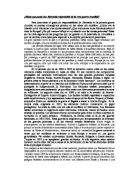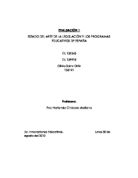Let us move on to Los Hijos de la Malinche where Paz scrutinizes the origins of the current Mexican character, defining it as solitude born out of denial. It is within this essay that the clearest connection between Mexican history and the Colonial period can be made. According to Paz, Mexicans today are categorised by their “moral de siervo”, which makes them “finge frente al señor”. A comparison can be made between the conquistadores and the indigenous people, master and slave. In this period a social hierarchy was imposed, the natives forced to the bottom strata. Subsequently, a mentality of “chingar o ser chingada” became the driving force, and today, Paz sees all relationships as being “envenenadas por el miedo y el recelo”. Both the poisoned exchanges between Mexicans and their serf mentality could be said to have derived from the mistreatment of the indigenous people by the conquistadores. In this way we can say that the Colonial period had an effect upon Mexican history. Again, Paz does not make this direct link himself allowing the reader to decipher the cause and effect.
Perhaps of most importance is his defining of chingar. Behind chingar, there is more than a mere Mexican profanity, there is an obsession with origins, revealed by the phrase “Viva México, hijos de la Chingada!”, a phrase which for Paz holds the “secreto” to their “ansiedad”. The secret is being the “fruto de una violación”, with two historical parental figures: the violated mother and the father who shows “indiferencia frente a la prole que engendra”. A direct identification can be seen, the mother as Doña Marina and the father as Cortés. For Mexicans, the passive mother is, “fascinadas, violadas o seducidas” by the father who “viene de lejos”. The animosity with the “gran Chingón” is what incurs them to deny their origins, discrediting the influence of the conquistadores and therefore the Colonial period. What’s more, the verb is used across the American continent to “denota violencia” and is “un verbo agresivo”. The word is endowed with negative connotations, negativity the Mexican wants to forget. Essentially the battle cry is, for Paz, the only time the Mexican shows “como somos de verdad” . In this way, as Mexican believe their character is completely determined by this violation, it is therefore what has contributed to their psyche. The continued usage of chingar in Mexico, coupled with its direct link to the Colonial period, confirms that colonialism has affected Mexican history and therefore psyche. Even Paz concedes that it does not seem “forzado asociarla a la Conquista”. What’s more, when analysing the title of the essay it is possible to see Paz denying these very origins. It echoes the battle cry but is also avoiding it’s repetition, using Malinche instead of Chingada. He is unable to escape from his intrinsic Mexican nature, thus he cannot accept his past.
Conquista y Colonia, found in the second half of the work, refers directly to the period of the conquest. It looks more specifically at historical episodes, yet still reveals a vast amount in terms of the relationship between the Mexican psyche and colonialism. Paz shows an appreciation that the Spaniards were “la defensora de la fe” and wanted to bring homogeneity to all the lands, to unify people under Christianity. Catholicism brought the opportunity for “bautismo” which in turn lead to enrolment within the society, due to “la unificación religiosa”. Moreover, Paz describes the conquistadores as “aventureros” almost glorifying their actions. This description portrays the conquest as a passive movement, particularly as he says that “todo preparaba la dominación española”. Similarly, Hamnett comments that historically, the indigenous population were accustomed to “subordination” and “assimilation”. However, the duality of the text is apparent as Paz, from the point of view of the indigenous people, shows an appreciation of the forced nature of the conquest and the unnatural “superposición tiránica” of the Christian faith. By contrast, he sees the conquest to be due to “el suicidio del pueblo azteca”, aggravated because “los dioses lo han abandonado”. Quiroga states that Paz sees colonial society “as a contradictory living totality”, which “despite its homogeneity” was split by the “competing claims of its many people”. For Paz, duality and lack of identity has always existed for the Mexican. Through Paz’s own explanation of the historical period of the conquest, he inadvertently exhibits the connection it has with the Mexican psyche. Despite this, Paz is again unwilling to confirm the impact colonialism has had on Mexican history, preferring to attribute it to “dualismo” of Aztec Gods. However, this merely highlights Paz’s own position as a Mexican, he negates his roots, trying to find shelter from his history.
Throughout the essay, the two biggest challenges have been to “escindir causas y efectos”, whilst considering Paz’s attitude as a Mexican. Stanton highlights Paz’s dilemma of whether “history determines national character” or vice versa. This is a question for which Paz has no concrete answer. However, the continued use of chingar in Mexico today is a strong argument that Mexican history has been affected by the Colonial period. Despite this, Paz is not always willing to confirm the connection because it means accepting the past, a past that he as a Mexican wants to forget. This conflict is the undertone to the hybridism of the text; on the one hand he wants to define his identity but on the other he wants to keep it a secret. This negation is why it is often hard to analyse the relationship between the Mexican psyche and colonialism, as Paz, as a Mexican, is not able to accept the full truth. Stanton holds a similar view, seeing the collection as an “essentialist definition of national identity and as the very negation of the possibility of this type of definition”. Similarly, the use of a labyrinth within the title supports this notion and shows another level to the text. Literally speaking, the Mexican is stuck in a self created labyrinth of his own solitude, unsure of how to escape, because he will not look for the way out. However, the labyrinth is also a reference to a myth, that of the Minotaur, and associating the Mexican solitude with a myth is perhaps Paz’s way of denying the very existence of this solitude. As well as this, it must be considered that this collection was written and conceived during voluntary exile, spending a year and a half in California 1943 and then a period in Paris from 1945 until 1951. It is important to note that Paz was a traveller, who forced upon himself an intentional exile, giving him the ability to reflect upon his own identity as a Mexican. This explains why, this collection is able to explain the Mexican psyche, as Paz is able to distance himself from his origins in order to think objectively. However, the constant conundrum of being Mexican, leads him to shy away from the truth at certain points throughout the collection.
Taking everything into consideration it is almost impossible to decipher whether Paz feels that colonialism has defined Mexican history, looking only at El Laberinto y la soledad. Each section of the text shows an insight into how Mexicans think but the cause is often masked. The duality which runs throughout the text, almost leading one to give a dual answer, is inherently is no answer at all. Paz states that Mexicans are “los únicos” who can “contestar” the question of their solitude, but inherently, as a Mexican, he cannot. However, I do feel that within the essays studied there is an overriding sense of betrayal and hatred directed toward elements attributed with the colonial rule, particularly the “gran Chingón”. Therefore, from an outsiders point of view, it can be accepted that colonialism had an impact on Mexican history but it does not irrevocably define that very history. As regard for Paz’s opinion, it is impossible to gauge a definite answer from the text due to Paz’s irresistible desire to refute much of his own history. However, Paz alludes to the impact that colonialism has had, but at certain points, he puts on his Mexican mascara and attempts to shy away from his origins he wishes to forget. What can be said is it most definitely does not irrevocably define, but perhaps aggravates an already apparent scar in the Mexican psyche.
Bibliography
Version of text used:
El laberinto de la soledad
Anthony Stanton
Manchester University Press 2008
The Labyrinth of Solitude
Translated by Lysander Kemp, Yara Milos and Rachel Phillips Belash
Penguin Books
Critical analysis:
A Concise History of Mexico
Brian R. Hamnett
University of Cambridge Press Published 1999
Octavio Paz
Jason Wilson
Published by Twayne Publishers 1986
Understanding Octavio Paz
José Quiroga. Columbia
University of South Carolina Press, 1999. xii, 194 p.
Background reading:
Octavio Paz and the Chicano
Author(s): Luis Leal
Source: Latin American Literary Review, Vol. 5, No. 10, Special Issue of Chicano Literature (Spring,1977), pp. 115-123
Published by:
Stable URL: http://www.jstor.org/stable/20119068
Octavio Paz: The Search for Mexican Identity
Author(s): Terry Hoy
Source: The Review of Politics, Vol. 44, No. 3 (Jul., 1982), pp. 370-385
Published by: for the
Stable URL: http://www.jstor.org/stable/1407050
The Fall of the Aztec Empire: Challenging Traditional Explanations
Connor J. Smith (‘04)
Octavio Paz The Mythic Dimension
Frances Chiles
American University Studies: Ser. 2, Romance Language and Literature; Vol.6)
Peter Lang Publishing Inc., New York 1987
“El laberinto de la soledad” (Stanton 2008:1)
Argument found in Wilson’s book where he describes Paz’s view of history is structured “on the belief –experience that human nature is not entirely historical (art, love, games, ceremonies escape historical definition), though the historical part actively represses this other poetic side. Paz view history morally. “Octavio Paz” (Wilson 1986:53)
Concept of the “other” Paz can be found in “Understanding Paz” (Quiroga 1999:80)
Argument of the submerged history is in the introduction “El laberinto de la soledad” (Stanton 2008: 2008:7)
“The Fall of the Aztec Empire: Challenging Traditional Explanations” (Smith 2004:1)
“A Concise History of Mexico” (Hamnett 1999:58)
“The Fall of the Aztec Empire: Challenging Traditional Explanations” (Smith 2004:1)
“El laberinto de la soledad” (Stanton 2008:93)
“El laberinto de la soledad” (Stanton 2008:78)
“Understanding Paz” (José Quiroga 1999:76)
“El laberinto de la soledad” (Stanton 2008:76)
“Understanding Paz” (José Quiroga 1999:75)
“El laberinto de la soledad” (Stanton 2008:92)
In Obras completas he states how Nietzsche showed him to look “detrás de palabras como virtud, bondad, mal” as human language says something about human nature.
“El laberinto de la soledad” (Stanton 2008:100)
Commonly nicknamed La Malinche.
“El laberinto de la soledad” (Stanton 2008:105)
“A Concise History of Mexico” (Hamnett 1999:58)
“El laberinto de la soledad” (Stanton 2008:117)
“Understanding Paz” (Quiroga 1999:80)
For a detailed analysis, see passage in Wilson’s book, discussing the problem of the impact of Catholicism as he describes “Mexican history becomes a dialectic (or rhythm) of solitude and communion, the ebb and flow of liberation/imprisonment” (Wilson 1986:54)
“El laberinto de la soledad” (Stanton 2008:113)
“El laberinto de la soledad” (Stanton 2008:3)
Paz talks about the Mexican mascara in the essay Mascaras Mexicanas found on Page 58 of Stanton’s book. In brief, he expressed the desire Mexicans have to live behind a metaphorical mask in order to be separated from their own identity, in order to become distant from everyone: “lejos, lejos del mundo de los demás.”
“El laberinto de la soledad” (Stanton 2008:95)







